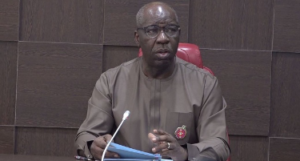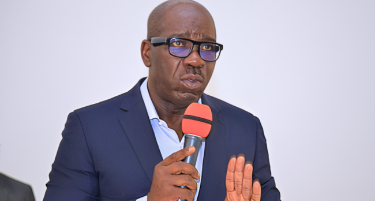Edo State Governor Godwin Obaseki, in collaboration with leaders from the Christian Association of Nigeria (CAN), the Pentecostal Fellowship of Nigeria (PFN), and various other Christian organizations in the state, has launched the second phase of the Christian Feeding Programme (CFP). This initiative aims to alleviate the hardships faced by residents by distributing 56,250 bags of 10-kilogram rice across the state’s three senatorial districts.
The distribution kicked off in Edo South Senatorial District, where Governor Obaseki inspected the warehouse at the Diocese of Benin Anglican Communion on Evbiemwen Street in Benin City. Here, the CAN chairman for Edo State, Apostle Irekpono Omoike, provided the governor with a detailed breakdown of how the rice will be allocated across the senatorial districts. Specifically, Edo South is set to receive 21,875 bags, Edo Central will get 15,625 bags, and Edo North will be allocated 18,750 bags, making up the total of 56,250 bags to be distributed in this second phase.
Governor Obaseki highlighted that the first phase of the CFP, conducted about three months ago, was also designed to mitigate the economic struggles of the people. He expressed his gratitude to the Christian leaders for their dedication to the program’s success, emphasizing that the initiative is entirely non-political and is managed by the Church itself to ensure transparency and effectiveness.
In his remarks, Governor Obaseki urged the Federal Government to take note of Edo State’s example, especially given the program’s success in reaching over 50,000 families. He pointed out that if national resources were managed properly, they could significantly benefit the populace. The governor criticized the current federal leadership for failing to adequately support Nigerians and highlighted the transparency, honesty, and commitment to public service demonstrated by the CFP.
“If things are done properly in this country, the resources of the nation will go a long way to serve the people. We know there are challenges, but the current leadership is not helping Nigerians. Look at how this program has been run successfully and transparently. The Federal Government should come learn from Edo State,” Obaseki said.
 He continued, “The organization of the CFP has been successful and able to reach about 50,000 families with food. It’s about transparency, honesty, and willingness to serve the people rather than private interest. This is a drop in the ocean compared to what the Federal Government claims they are doing. The world is currently challenged, but the government needs to come out clean and transparent for people to trust them and collaborate with them to come out of the problems facing us.”
He continued, “The organization of the CFP has been successful and able to reach about 50,000 families with food. It’s about transparency, honesty, and willingness to serve the people rather than private interest. This is a drop in the ocean compared to what the Federal Government claims they are doing. The world is currently challenged, but the government needs to come out clean and transparent for people to trust them and collaborate with them to come out of the problems facing us.”
Governor Obaseki also appealed to the public to refrain from actions that could exacerbate the current challenges. He announced plans to engage with citizens in the coming days to discuss solutions and strategies to avoid further complications.
“This program will be in three phases. We are through with the first phase and this second phase is to correct some of the mistakes in the first phase as trust has been built. It’s also to consolidate on what we have done in the first phase,” he explained. The third phase, according to the governor, will focus on enrolling people in conditional cash transfer programs, skill development initiatives, support for agriculture, trade, micro-finance, and more.
Apostle Irekpono Omoike, the CAN chairman, expressed his gratitude to Governor Obaseki for his considerate efforts and the palliative measures aimed at cushioning the adverse effects of the subsidy removal on the populace. He acknowledged that the governor’s comprehensive palliative program, of which the CFP is a part, is designed to ease the burden and hardship experienced by the people.
This second phase of the CFP reflects a continued commitment to providing relief and support to Edo State’s residents, demonstrating the power of collaboration between the government and religious organizations to address and mitigate economic challenges effectively. As the program progresses, it holds the promise of further stabilizing and improving the livelihoods of many families across the state.




